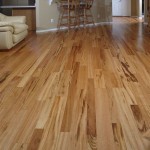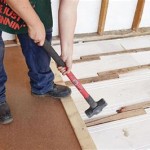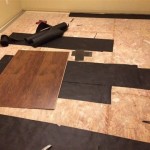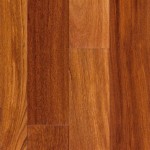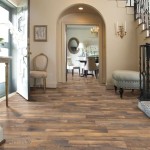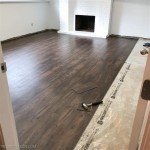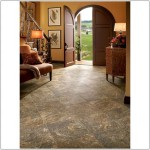The Benefits and Drawbacks of Cork Flooring in Bathrooms and Kitchens
Cork flooring has gained popularity in recent years as a sustainable and stylish alternative to traditional flooring options like tile and hardwood. Its unique properties make it particularly well-suited for bathrooms and kitchens, two areas of the home where durability, moisture resistance, and comfort are crucial. However, like any flooring material, cork has its own set of advantages and disadvantages, and it's essential to weigh these carefully before making a decision. This article will explore the key benefits and drawbacks of cork flooring in bathrooms and kitchens, providing a comprehensive understanding to aid in the decision-making process.
Benefits of Cork Flooring
Cork flooring offers a compelling combination of aesthetic appeal, practicality, and sustainability, making it a desirable choice for many homeowners. Here are some of its notable benefits:
1. Natural and Sustainable
Cork is a renewable and sustainable material derived from the bark of the cork oak tree. The harvesting process is environmentally friendly, as the bark regenerates naturally, ensuring a continuous supply without harming the trees. This makes cork flooring an excellent choice for eco-conscious individuals seeking sustainable building materials. Cork is also biodegradable and hypoallergenic, further contributing to its environmental appeal.
2. Comfort and Warmth
Cork flooring provides a naturally soft and warm feel underfoot, making it a comfortable option for bathrooms and kitchens. Its inherent elasticity absorbs impact and reduces noise, creating a quiet and pleasant environment. This is especially beneficial in bathrooms, where bare feet are common, and kitchens where heavy foot traffic can create noise.
3. Moisture Resistance
Cork's natural cellular structure makes it inherently resistant to moisture. The cells are filled with air, giving the material its buoyancy and ability to repel water. This makes cork flooring suitable for bathrooms and kitchens, where spills and splashes are inevitable. However, it's crucial to seal cork flooring with a water-resistant sealant to enhance its moisture protection and prevent warping or damage.
4. Sound Absorption
Cork flooring's ability to absorb sound makes it an excellent choice for reducing noise levels in bathrooms and kitchens. This feature is especially beneficial in open-plan homes where noise from these rooms can easily travel to other areas. Cork's sound-dampening properties contribute to a more peaceful and comfortable living environment.
5. Anti-Slip Properties
Cork flooring provides a naturally slip-resistant surface, making it safer for bathrooms and kitchens, where spills and wet surfaces are common. Its textured surface offers better traction than smooth flooring materials, reducing the risk of slips and falls. This is particularly important for elderly individuals or families with young children who may be prone to falls.
6. Easy Maintenance
Cork flooring is relatively easy to maintain. Regular sweeping or vacuuming is sufficient to remove dust and debris. Occasional mopping with a damp cloth and mild detergent is recommended to clean spills and stains. Cork's natural durability makes it resistant to scratches and dents, further simplifying maintenance.
Drawbacks of Cork Flooring
While cork flooring offers numerous advantages, it's essential to consider its potential drawbacks before making a decision. Understanding these limitations can help ensure that cork flooring is the right choice for your particular needs and preferences.
1. Susceptibility to Dents and Scratches
Despite its durability, cork flooring can be susceptible to dents and scratches from heavy furniture or sharp objects. It's crucial to use furniture pads or coasters to protect the surface from damage. While cork is relatively forgiving regarding minor scratches, deeper gouges may be difficult to repair.
2. Limited Color Options
Cork flooring generally offers a limited range of colors and patterns compared to other flooring options like tile or hardwood. This can limit design choices for homeowners seeking a specific aesthetic. While cork flooring is available in various shades of brown, red, and beige, more vibrant colors and intricate patterns are less frequent.
3. Cost
Cork flooring can be more expensive than other flooring materials like vinyl or laminate. The cost varies depending on the quality, thickness, and installation complexity. However, cork flooring's longevity and sustainability can offset the initial cost over the long term.
4. Requires Sealing
Cork flooring requires regular sealing to maintain its moisture resistance and protect it from stains. The sealant needs to be reapplied periodically, typically every one to two years, depending on the traffic level and exposure to moisture. This additional maintenance should be factored into the overall cost and effort required.
5. Susceptibility to Sunlight
Cork flooring can fade or discolor when exposed to prolonged sunlight. While this is primarily a concern for areas receiving direct sunlight, it's essential to consider the placement and window treatments to minimize the risk of fading. Using UV-resistant sealant can also help protect the floor from sun damage.
Conclusion
Cork flooring presents a unique blend of benefits and drawbacks, making it a viable option for homeowners seeking a natural, comfortable, and sustainable flooring solution. Its moisture resistance, warmth, and sound absorption make it a valuable choice for bathrooms and kitchens. However, its susceptibility to dents and scratches, limited color options, and maintenance requirements should be carefully considered. By weighing the pros and cons, homeowners can determine if cork flooring aligns with their individual needs and preferences for these high-traffic areas of the home.

Cork Flooring Pros And Cons Is It The Right Choice For You Angi

Cork Flooring Pros Cons And Everything You Need To Know

Cork Flooring Pros And Cons Everything You Need To Know America S Floor Source

Cork Flooring Guide Specifics Pros Cons Fantastic Handyman Au

Can You Use Cork Flooring In A Kitchen Portuguese Treasures

Cork Flooring Review Pros And Cons Compared To Oak

Cork Flooring Pros And Cons Everything You Need To Know America S Floor Source

Cork Flooring 18 Advantages And Disadvantages Lcf Ltd

Cork Flooring Vs Wood Floors Which Is Right For You Artisan Llc

Pros And Cons Of Cork Flooring Is It Right For You Bob Vila
See Also
